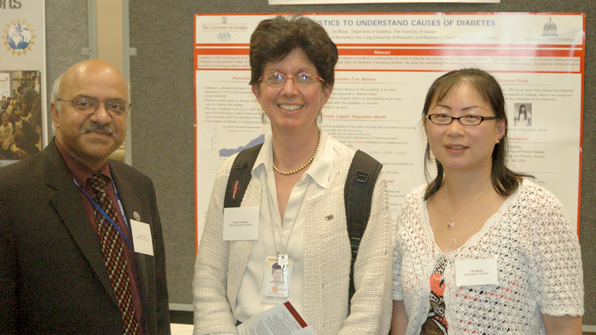Making the Case for the National Science Foundation
ASA joins with 31 organizations in poster exhibit and day of meetings on the Hill
This column is written to inform ASA members about what the ASA is doing to promote the inclusion of statistics in policymaking and the funding of statistics research. To suggest science policy topics for the ASA to address, contact ASA Director of Science Policy Steve Pierson at pierson@amstat.org.
Contributing Editor
Steve Pierson earned his PhD in physics from the University of Minnesota. He spent eight years in the physics department of Worcester Polytechnic Institute and later became head of government relations at the American Physical Society before joining the ASA as director of science policy.
The ASA participated in the annual Coalition for National Science Funding Exhibition and Reception for the third straight year on May 15 and featured the National Science Foundation (NSF)-supported work of University of Georgia professor Lily Wang. The evening reception attracted 270 people, including five members of Congress. The purpose of the event, now in its 18th year, is to highlight to congressional members and staff some of the research the NSF funds.
Prior to the reception, Wang spent the day with me, visiting the offices of Georgia senators and representatives and explaining how her NSF funding is important to the country, Georgia, and her students and research. Wang could speak first-hand to the international competition to attract top scientific talent and also emphasized the many dividends research pays to the economy and U.S. competitiveness. Wang and I also discussed why funding research is an important federal function.
In all, Wang met with staff for two Georgia senators and five of the 13 U.S. House representatives from Georgia. In addition to her own congressional representative, Paul Broun (R-GA)—who chairs a house science, space, and technology subcommittee—she met with staff for two freshmen and two members of the House Appropriations Committee.
Consistent with the House’s extraordinary support of NSF this year and last—supporting budget increases for NSF in this challenging fiscal environment—the staffers Wang and I met with understood the importance of NSF to our nation’s economy and economic competitiveness.
In reflecting on her day on the Hill and the evening exhibit and reception, Wang called this experience “one of the most meaningful” of her career. She added, “I came back convinced of the need and impact of communicating the importance of federal support for research funding to Congress by individual scientists like me.”
For each office, Wang provided material specific to Georgia, including the amount of research funded in Georgia in FY11—$110 million—and how much individual institutions received. She also provided a document with examples of the benefits of NSF funding to Georgia and the ASA Statistical Significance pieces.

University of Georgia statistics professor Lily Wang (right) with NSF Division of Mathematical Science director Sastry Pantula (left) and Sharon Hessney (center). Hessney is a staffer for Sen. Al Franken (D-MN) and ASA member.
For her poster at the ASA booth, Wang highlighted her research on causes of diabetes, but also told staffers about her NSF-supported work on economic forecasting, survey response, and environmental modeling.
With input from the ASA Committee for Federally Funded Research, the ASA focused on inviting an ASA member from Georgia because of Georgia’s representation on the House panel that determines the NSF budget. Other such states include Alabama, Kansas, Ohio, Texas, and Virginia.
The ASA urges its members to contact their elected officials in Washington, DC, about the importance of NSF and National Institutes of Health research. Contact me at pierson@amstat.org for further guidance and materials.
Science Policy Actions
• The ASA signed letters to Congress opposing restrictions on government employees’ participation in meetings and conferences.
• The ASA signed a letter urging the restoration of the salary limit imposed on extramural NIH researchers to Level I of the executive pay scale.
• The ASA submitted comments on The Mathematical Education of Teachers II.
• The ASA signed letter in support of the American Community Survey.

















